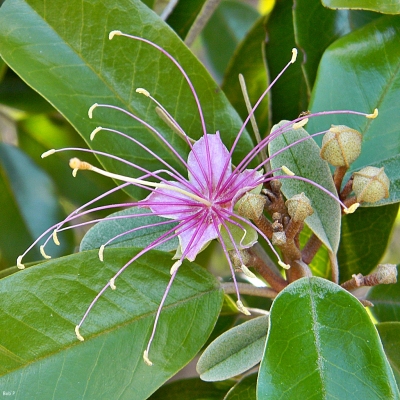Capparis cynophallophora
L.
Capparaceae
The nomenclature of this species is incredibly confusing. The original taxon name is used here as per the treatment in GRIN, but there are several other possibilities! The Plant List and Flora of N. America accept Quadrella cynophallophora (L.) Hutch., as the correct name[
270- Title
- Flora of N. America
- Publication
-
- Author
-
- Website
- http://flora.huh.harvard.edu/fna/
- Publisher
-
- Year
- 0
- ISBN
-
- Description
- An on-line version of the flora with an excellent description of the plant including a brief mention of plant uses.
], whilst it has also been treated as a synonym of Capparis flexuosa (L.) L., which itself has been transferred to Cynophalla flexuosa (L.) J.Presl[
K- Title
- Plants for a Future
- Author
- Ken Fern
- Description
- Notes from observations, tasting etc at Plants For A Future and on field trips.
]. The taxon is also subdivided with Capparis cynophallophora (or Quadrella cynophallophora) being restricted to the Bahamas and Hispaniola, whilst Capparis jamaicensis Jacq. (or Quadrella jamaicensis (Jacq.) J.Presl) is recognised as distinct with a range that covers southeast N. America, Cuba and Jamaica[
270- Title
- Flora of N. America
- Publication
-
- Author
-
- Website
- http://flora.huh.harvard.edu/fna/
- Publisher
-
- Year
- 0
- ISBN
-
- Description
- An on-line version of the flora with an excellent description of the plant including a brief mention of plant uses.
,
K- Title
- Plants for a Future
- Author
- Ken Fern
- Description
- Notes from observations, tasting etc at Plants For A Future and on field trips.
].
Capparis isthmensis Eichler
Capparis jamaicensis Jacq.
Quadrella cynophallophora (L.) Hutch.
Uterveria cynophallophora (L.) Bertol.
Common Name:

The intoxicating wild scent led me to this Jamaica caper blossom. The flowers are pure white when first open, becoming lavender-violet after a couple of hours.
Photograph by: Bob Peterson
Creative Commons Attribution-Share Alike 2.0

The intoxicating wild scent led me to this Jamaica caper blossom. The flowers are pure white when first open, becoming lavender-violet after a couple of hours.
Photograph by: Bob Peterson
Creative Commons Attribution-Share Alike 2.0


Cultivated plant in the United States Botanic Garden, Washington, DC, USA.
Photograph by: Daderot
Public domain

Two stages of the flower above, the ripening fruit (bottom left) and the ripe fruit opening to reveal the sticky seeds
Photograph by: Bob Peterson
Creative Commons Attribution-Share Alike 2.0
General Information
Capparis cynophallophora is an evergreen shrub or a tree with a dense, compact crown; it can grow 3 - 6 metres tall[
447- Title
- Common Trees of Puerto Rico and the Virgin Islands
- Publication
-
- Author
- Little E.L.; Wadsworth F.H.
- Publisher
- USDA, Forest Service; Washington.
- Year
- 1964
- ISBN
-
- Description
- Contains detailed information, and usually an illustration, on 250 tree species, including both native and exotic species.
].
The tree is harvested from the wild for local use as a medicine and source of wood. It is occasionally cultivated in parks and as a street tree[
447- Title
- Common Trees of Puerto Rico and the Virgin Islands
- Publication
-
- Author
- Little E.L.; Wadsworth F.H.
- Publisher
- USDA, Forest Service; Washington.
- Year
- 1964
- ISBN
-
- Description
- Contains detailed information, and usually an illustration, on 250 tree species, including both native and exotic species.
].
Known Hazards
None known
Botanical References
Range
C. America - Panama, Costa Rica, Guatemala, Mexico; Caribbean - Trinidad to Cuba and the Bahamas; SE N. America - Florida.
Habitat
Coastal thickets[
447- Title
- Common Trees of Puerto Rico and the Virgin Islands
- Publication
-
- Author
- Little E.L.; Wadsworth F.H.
- Publisher
- USDA, Forest Service; Washington.
- Year
- 1964
- ISBN
-
- Description
- Contains detailed information, and usually an illustration, on 250 tree species, including both native and exotic species.
].
Properties
| Medicinal Rating |      |
| Other Uses Rating |      |
| Habit | Evergreen Tree |
| Height | 4.00 m |
| Cultivation Status | Ornamental, Wild |
Cultivation Details
Succeeds in full sun to light shade. The plant is very tolerant of salt-laden winds.
Edible Uses
None known
Medicinal
The roots and leaves are used medicinally[
447- Title
- Common Trees of Puerto Rico and the Virgin Islands
- Publication
-
- Author
- Little E.L.; Wadsworth F.H.
- Publisher
- USDA, Forest Service; Washington.
- Year
- 1964
- ISBN
-
- Description
- Contains detailed information, and usually an illustration, on 250 tree species, including both native and exotic species.
].
Other Uses
The heartwood is yellow, tinged with red; the sapwood is light brown. The wood is hard, and heavy. It is only used for posts[
447- Title
- Common Trees of Puerto Rico and the Virgin Islands
- Publication
-
- Author
- Little E.L.; Wadsworth F.H.
- Publisher
- USDA, Forest Service; Washington.
- Year
- 1964
- ISBN
-
- Description
- Contains detailed information, and usually an illustration, on 250 tree species, including both native and exotic species.
].
The wood is used for fuel[
447- Title
- Common Trees of Puerto Rico and the Virgin Islands
- Publication
-
- Author
- Little E.L.; Wadsworth F.H.
- Publisher
- USDA, Forest Service; Washington.
- Year
- 1964
- ISBN
-
- Description
- Contains detailed information, and usually an illustration, on 250 tree species, including both native and exotic species.
].
Propagation
Seed -
If you have any useful information about this plant, please leave a comment. Comments have to be approved before they are shown here.





 Useful Tropical Plants Database 2014 by
Ken Fern,
web interface by
Ajna Fern
with help from
Richard Morris.
Useful Tropical Plants Database 2014 by
Ken Fern,
web interface by
Ajna Fern
with help from
Richard Morris.